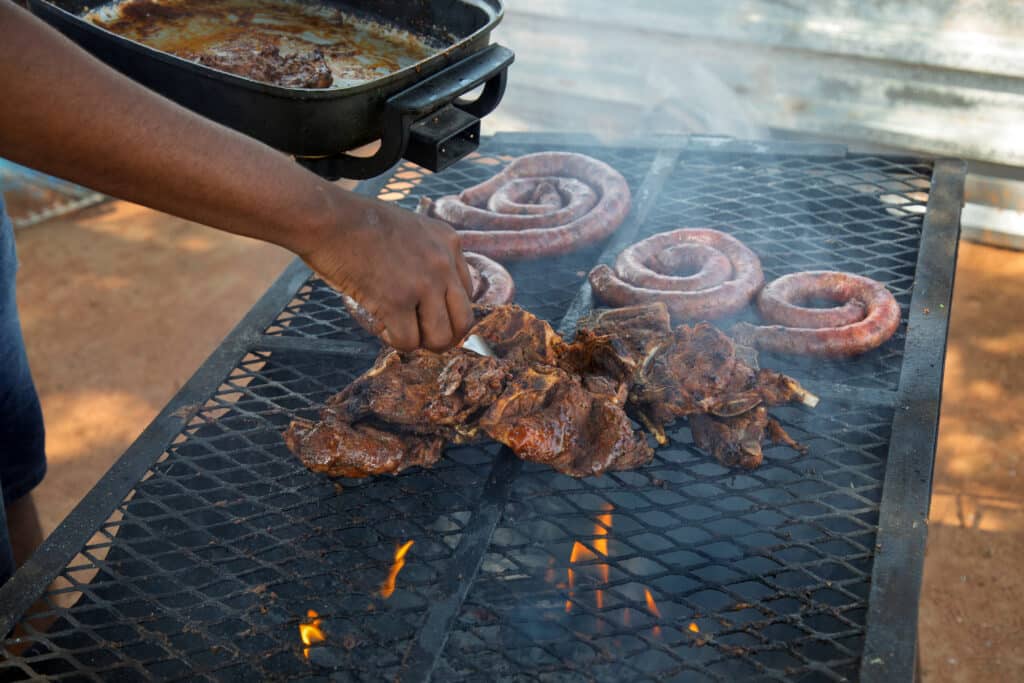
Grilling and eating BBQ in my household was a part of life. It was a rite of passage for the young men in the family to show that they were growing up. Men (and women) across the country love to grill. There are shows, restaurants, and big money competitions all dedicated to the art of grilling.
Does Charcoal Grilling Cause Cancer?
Anything that is shown to promote the growth of cancer is considered to be carcinogenic.
Charcoal itself is not a carcinogen, but cooking with charcoal does have a link to cancer. There are two main reasons for this. The first risk of charcoal use is that you’re cooking foods at very high temperatures, and the second is that charcoal cooking creates a lot of smoke. Both smoking and high-temperature cooking of certain meats are known to be carcinogenic.
A growing body of research suggests that cooking meats over a flame is linked to cancer. Combusting wood, gas, or charcoal emits chemicals known as Polycyclic Aromatic Hydrocarbons. Exposure to these so-called PAHs is known to cause skin, liver, stomach, and several other types of cancer in lab animals, but how does it affect humans?
Heterocyclic amines (HCAs) form in protein-rich foods when cooked at a very high heat, like that of your backyard barbecue, experts explain. PAHs form when fat drips and burns on the grill, creating smoke. As the smoke circulates around your meat, those compounds can get deposited on whatever you’re grilling and you consume it.
MUST READ: Should You Give Up Meat? Here’s The Real Test…
Of course, charcoal isn’t the only way to cook food at high temperatures. Additionally, not all foods respond the same way to charcoal cooking, meaning that not all types of charcoal grilling carry the same cancer risk. In fact, some types of charcoal grilling are considered very safe. However, cooking with charcoal can create carcinogens in some foods.
Long story short, while it may not directly cause cancer, frequent grilling does increase your cancer risk.
According to 2013 research findings, there’s not enough evidence in humans to just give up grilling altogether. Shoot, before all these new ways of cooking, many people were eating from what humankind has done since the beginning of time: eat meat over fire. But now, since food is packaged and prepared differently, and even charcoal is made differently, we have to be more careful with how we grill. Here are four things we can do:

How to Protect Yourself Against Charcoal
1. Use Foil
A little foil over the grill can help. Covering the grates with perforated foil still allows juices to drip, but prevents some of the resulting smoke from rising up, according to Reader’s Digest. Similarly, skip piercing your meat to see if it’s done, says Doyle, since doing so causes more fat to drip and drain and more smoke to billow.
If you still want to grill on charcoal, wait for the charcoal to become low-burning embers. Don’t try to grill while the fire is super hot and the coals are black. The steady, low-burning charcoal emits fewer HCA’s but with nearly the same level of heat.
There’s also mounting evidence that the way you prepare your meat can make a difference. Marinating meat, even just for 30 minutes, seems to limit carcinogen formation. A number of spices, in addition to adding fun flavor, seem to offer particular protection, including red pepper, thyme, sage, garlic, and especially rosemary, Health.com reported.
2. Have Healthier Side Dishes
What you select for a side dish can help, too. Instead of having the usual chips, baked beans or spaghetti, choose fruits and veggies which are rich in naturally-occurring, cancer-fighting phytochemicals. They also may help combat the damaging effects of overdone meat, HealthDay reported. Plus, they only need a short time on the grill to take on that smoky flavor.
3. Stay Away From Processed Meats
We know it’s easier to get already pre-made burgers and hot dogs, but that may not be the way you want to go. Those hot dogs, sausages, and red meat, in general, you might contemplate grilling have been associated with increased risk of colorectal and pancreatic cancers, as well as an increased risk of dying from cancer or heart disease, according to 2013 research.
Instead, just make your own hamburgers and spend a little extra money for all-natural, no preservatives, hormone-free sausages and links.
4. Watch Your Fire
One of the first rules in grilling is to watch your flame and control the heat.
Avoid high heat and direct flames, as they can produce carcinogenic compounds like heterocyclic amines (HCAs) and polycyclic aromatic hydrocarbons (PAHs). Also, reduce fat flare-ups by trimming visible fat from meats to minimize flare-ups and the formation of PAHs. Consider using foil under the meat to reduce dripping and smoke.








